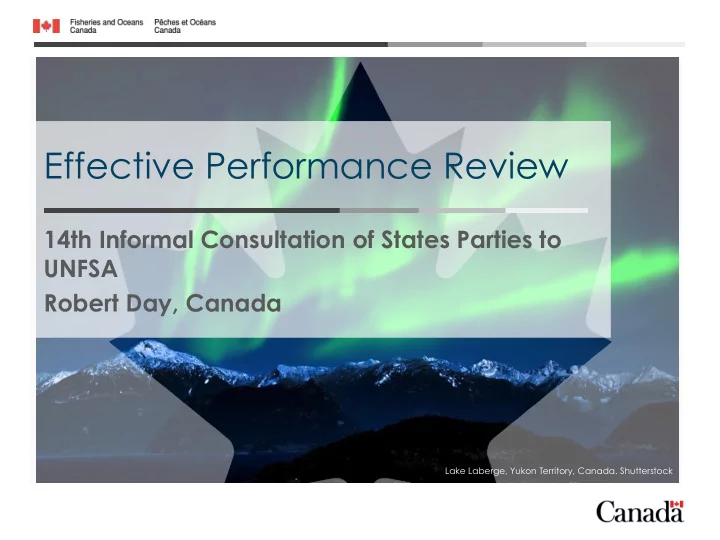

Effective Performance Review 14th Informal Consultation of States Parties to UNFSA Robert Day, Canada Lake Laberge, Yukon Territory, Canada. Shutterstock
Brief Historical Context Source: FAO
Canada’s Interest in Shared Fisheries Domestic and international protection and conservation • of fishery resources - stable and sustainable fishing sector Decision-making framework designed for management • action based on principles of sustainability, precaution and ecosystem considerations Continuous efforts to improve shared management • since the early 1900’s Active support for effective regional management • through regional bodies such as NAFO, including on: • Ecosystem approach to fisheries management • Reforms to the decision-making process • Strengthening obligations of Contracting Parties • Implementing a formal dispute resolution mechanism 3
NAFO Ecosystem Approach to Fisheries Roadmap Source: NAFO
Current and Emerging Global Mechanisms • Support for updates to global systems such as UNFSA, and the FAO Code of Conduct for Responsible Fisheries • Active engagement in UN negotiations to develop a new treaty to address the conservation and sustainable use of marine biodiversity of areas beyond national jurisdiction (BBNJ) • Provision in Res 72/249 that BBNJ process should “not undermine existing relevant legal instruments and frameworks and relevant global, regional and sectoral bodies”, including RFMOs • Need to address cumulative impacts, including from fisheries 5
Strengthening the UNFSA Review Process: a Canadian contribution • “Recommended Best Practices for Regional Fisheries Management Organizations: Report of an independent panel to develop a model for improved governance by Regional Fisheries Management Organizations” (Chatham House, London) • Recommended best practices for RFMOs , known as a “model RFMO”. • Can serve as a basis for evaluating the effectiveness of the bodies through regular performance reviews - Lodge et al, 2007. 6
Performance Review Timing • Performance reviews can be time-consuming • Need to balance the contribution to continual improvement of the body, with resources required to undertake them (human and financial costs) • No “one size fits all” sequence for performance reviews, but a general format could be: • Five year cycle of review, followed by implementation of recommendations • Subsequent performance reviews would be less onerous than the first, focus more on specific key areas 7
Review Team – Canada’s experience • Reviews conducted by a range of experts: • fully external • mix of external and internal • external via a consultancy • Successful reviews are undertaken with a combination of: • Internal experts representing the members, with knowledge of and experience with the body; and • External experts with a broader range of experience and expertise (i.e., in science, management and legal) 8
Implementation and Assessment Need for commitment among • members to: • The process itself • Assessing results and considering implementation of recommendations Members need to consider their ability to adopt • outcomes, taking into account their sovereign rights Identifying organizational weakness through reviews • often cited as beneficial Consideration of requirements of developing • state members of RFMOs, including small island states and participating territories • Underscored in UNFSA and specifically outlined in the Conventions of some RFMOs 9
Opportunities for Improvement • Do we have the necessary political will? • Importance of consensus-based decision-making • Integration of external drivers / new processes • Res. 61/105 (bottom fisheries resolution) Implementation of BBNJ objectives while not undermining RFMO mandates and activities • Impacts of climate change 10
OBJECTIVE: Healthy ecosystems and reduced biodiversity loss Sharing information across management bodies, cumulative impact etc Fishing MSR Oil & Ship- Security Other Other Gas ping & safety Knowledge Global norms Mgt. standards incl EAF Incentives Compliance Monitoring Etc Common goals and objectives (ecological, economic, social) Integrated knowledge, common baseline assessments (MEQ), risk assessment, indicators etc, Existing and new legal and regulatory frameworks (e.g., UNCLOS, UNFSA, BBNJ) 11
Recommend
More recommend